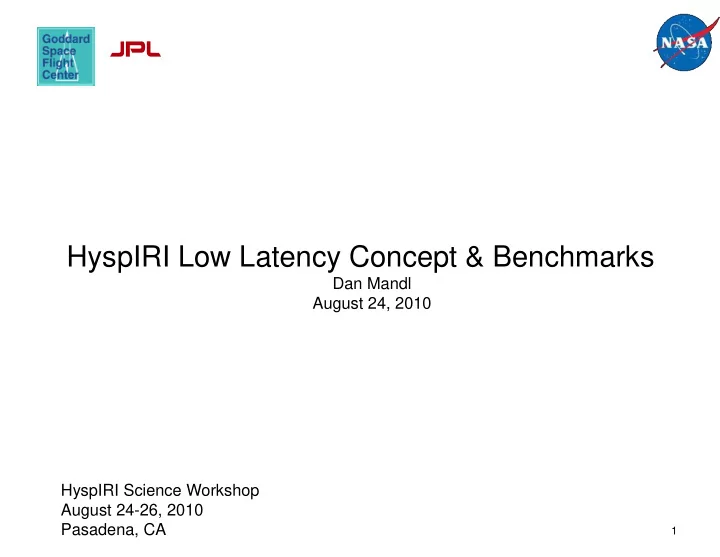

HyspIRI Low Latency Concept & Benchmarks Dan Mandl August 24, 2010 HyspIRI Science Workshop August 24-26, 2010 Pasadena, CA 1
HyspIRI Low Latency Data Ops Concept 804 Mbps 132 Mbps Hyperspectral Visible Multispectral ShortWave InfraRed Thermal InfraRed (VSWIR) Imaging (TIR) Scanner Spectrometer Spectral Spectral Bands (8) 3.98 μ m, 7.35 Direct Range 380 to 2500 nm μ m, 8.28 μ m, 8.63 μ m, 9.07 10 nm bands Broadcast μ m, 10.53 μ m, 11.33 μ m, Spatial 12.05 Range ~146 km Spatial ( 13.2 deg. at 626km) IFOV 60 m Cross-Track Samples >2560 Range 600 km ( ± 25.3 ° at Sampling 60 m 626 km) • 20 Mbps Direct Broadcast (10Mbps data throughput) • Downlink Select Spectral Bands • Select L-2 Products • Continuous Earth-view Broadcast 2
HyspIRI Data Flow Command TIR & Data 130.2 Mbps Handling Solid State 804 Mbps VSWIR Recorder Direct Broadcast IPM Module Spacecraft 20 Mbps S-band X-band 800 Mbps S-band housekeeping Science data command data Direct Broadcast Antennas 3 To/From Alaska and Norway Ground Stations
Ongoing Efforts • Baseline detailed operations concept used to derive cost estimate to be presented by Steve Chien • Web Coverage Processing Service (WCPS) Allows scientists to define algorithms that can be dynamically loaded onboard satellite or execute as part of the ground processing • Open Science Data Elastic Cloud Many custom products generated in parallel by many virtual machines Complex products generated in concurrent steps (parallel processing) Elastic response to unanticipated user demand Quick user access (multi-gigabit access) Easy expandability of cloud as needed • Benchmarking of CPU’s for Intelligent Payload Module SpaceCube ( initial results presented at previous workshop) Other CPU’s (future workshops) Onboard processing • Delay Tolerant Network Communication Connectivity Upload of algorithms and download of data with fault and delay tolerant connection 4
Experiment with Web Coverage Processing Service (WCPS) Approach to Injecting New Algorithms into SensorWeb Agent Converts WEKA Tree Machine Learning Object to WCPS Algorithm Data Mining / Classifier Decision Tree EO-1, HyspIRI… Science User GlobalHawk, Ikhana… Dynamic NASA Cloud Upload Infrastructure As A Service (IAAS) Collaboration with Open Cloud Consortium EO-1, HyspIRI data Reflectance WCPS Interface Algorithms Intelligent Agents Pattern Matching Algorithms Geometric Correction Algorithms Custom Algorithm Upload With Satellite Tasking, Image Acquisition & Processing Custom Data Product Data Distribution And Data Delivery (KMZ, PNG…) (e.g. oil classifier) And Notification
Mobile Bay Oil Spill Detection Using EO-1 Advance Land Imager Data green = land white = cloud & sand black = cloud shadow blue = clear water grey = surface oil
Low Fidelity HyspIRI IPM Testbed NETGEAR Gigabit Switch Data Generator Workstation Compact Flash • Allows the board and the data generator workstation to connect at • Generates test data and streams it • Ext3 formatted file Gigabit speed. to the board at rate up to 800Mbps. system with Linux libraries and tools Platform Cable USB • Provides an easy method for debugging software running on the board Virtex-5 FPGA Xilinx ML510 Development Board • GSFC SpaceCube 2 core FPGA • Enables the development team to • Configured as dual 400MHz PPC design verify the Virtex-5 while the GSFC • Capable of running with Linux or in a SpaceCube 2 is finalizing the design standalone mode 7
Compute Cloud Testbed • Open Cloud Consortium (OCC) providing rack with 120 Tbytes usable, 1 – 10 Gbps fiber interface connected to GSFC and Ames and 320 core to support hundreds of virtual machines (part of larger expandable infrastructure consisting of 20 racks) System admin support Funded by multiple sources including National Science Foundation Will stand up 100 Gbps interface wide area cloud (future) Expect to be there at least 5+ years • Created account on BioNimbus cloud for NASA use Demonstrated performing EO-1 ALI Level 1R and Level 1G processing in cloud • Will receive dedicated cloud compute rack in August 2010 donated by Open Cloud Consortium Plan to port automated atmospheric correction using ATREM on Hyperion Level 1R to cloud (presently running on GSFC server) In process of integrating FLAASH atmospheric correction into an automated process for Hyperion for Level 1R and then porting to cloud Plan to demonstrate Hyperion level 1R and Level 1G processing in cloud Plan to demonstrate multiple simultaneous automated higher level data products maximizing clouds ability to handle parallel processing Make use of software agent-based architecture for intelligent parallel data processing for multiple data products Experiment with security in open cloud (Open ID/OAuth) 8
Open Cloud Testbed Environment Astronomical data Biological data (Bionimbus) Networking data Image processing for disaster relief & 9 HyspIRI Cloud Benchmarking
Global Lambda Integrated Facility (GLIF) OCC Collaboration with Starlight (part of GLIF) GLIF is a consortium of institutions, organizations, consortia and country National Research & Education Networks who voluntarily share optical networking resources and expertise to develop the Global LambdaGrid for the advancement of scientific collaboration and discovery.
Delay Tolerant Network (DTN) Protocol Benchmarking • Prototype being funded by NASA HQ / SCAN Purpose is to provide space network that is delay/disruption tolerant Using EO-1 in FY 11 to demonstrate various scenarios (Hengemihle) Trying to demonstrate how it is applicable to low earth observing missions • HyspIRI applicability Upload new data processing algorithms for IPM Can send algorithm to DTN node without regard to when contact with satellite occurs DTN node handles uplink when there is contact and send confirmation back to originator Examining scenarios during Direct Broadcast to handle delays during downlink E.g. data product ready but DB station not in view, DB node onboard receives data product and waits for contact to handle downlink and confirmation 11
EO-1 Configuration for Preliminary Delay Tolerant Network (DTN) Prototype Lead: Jane Marquart Implementers: Rick Mason, Jerry Hengemihle/Microtel 12
Conclusion • Experimenting with various bottlenecks for end-to-end data flow for low latency users of HyspIRI • Leveraging other funds and using HyspIRI funds to tailor for the HyspIRI mission • Results applicable to other high data volume Decadal missions 13
Recommend
More recommend